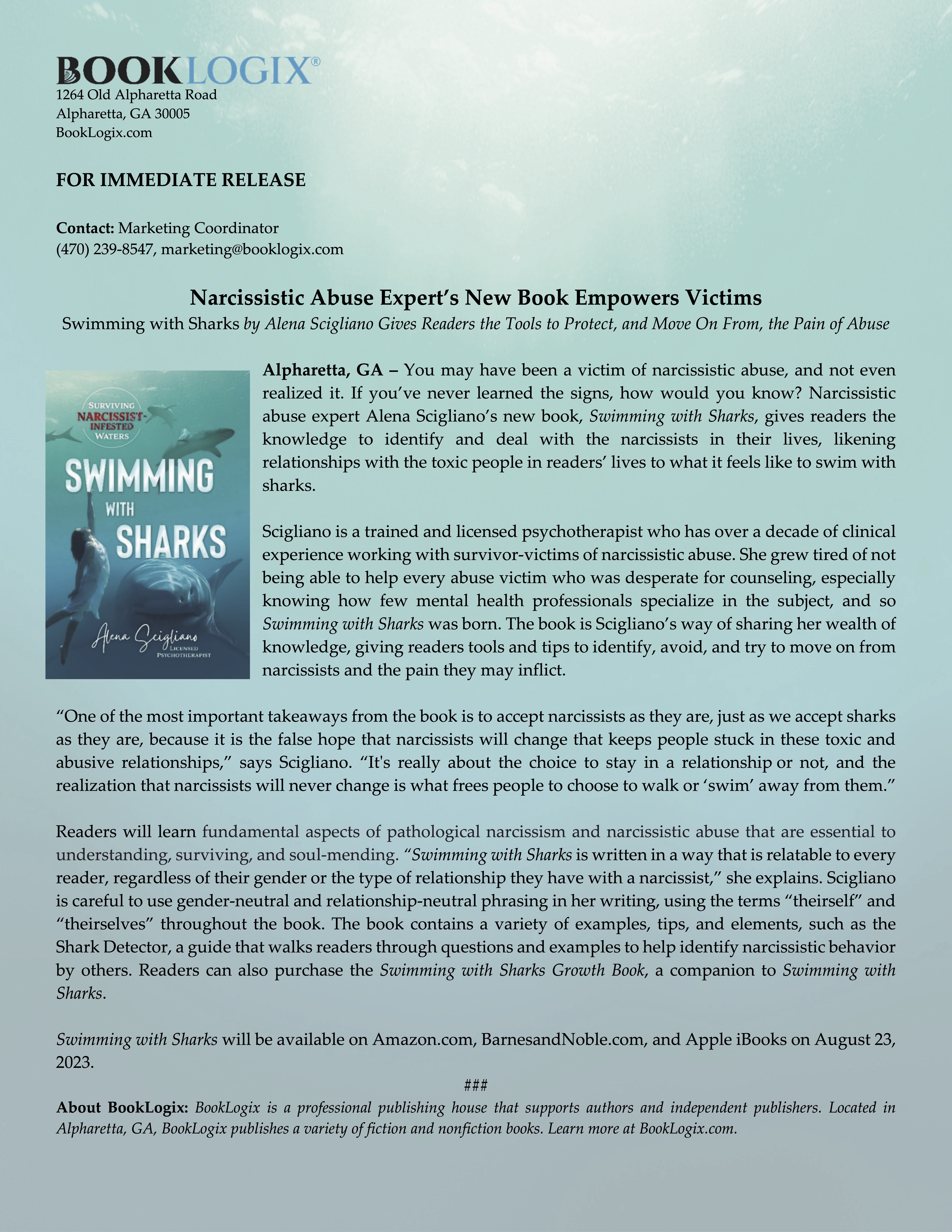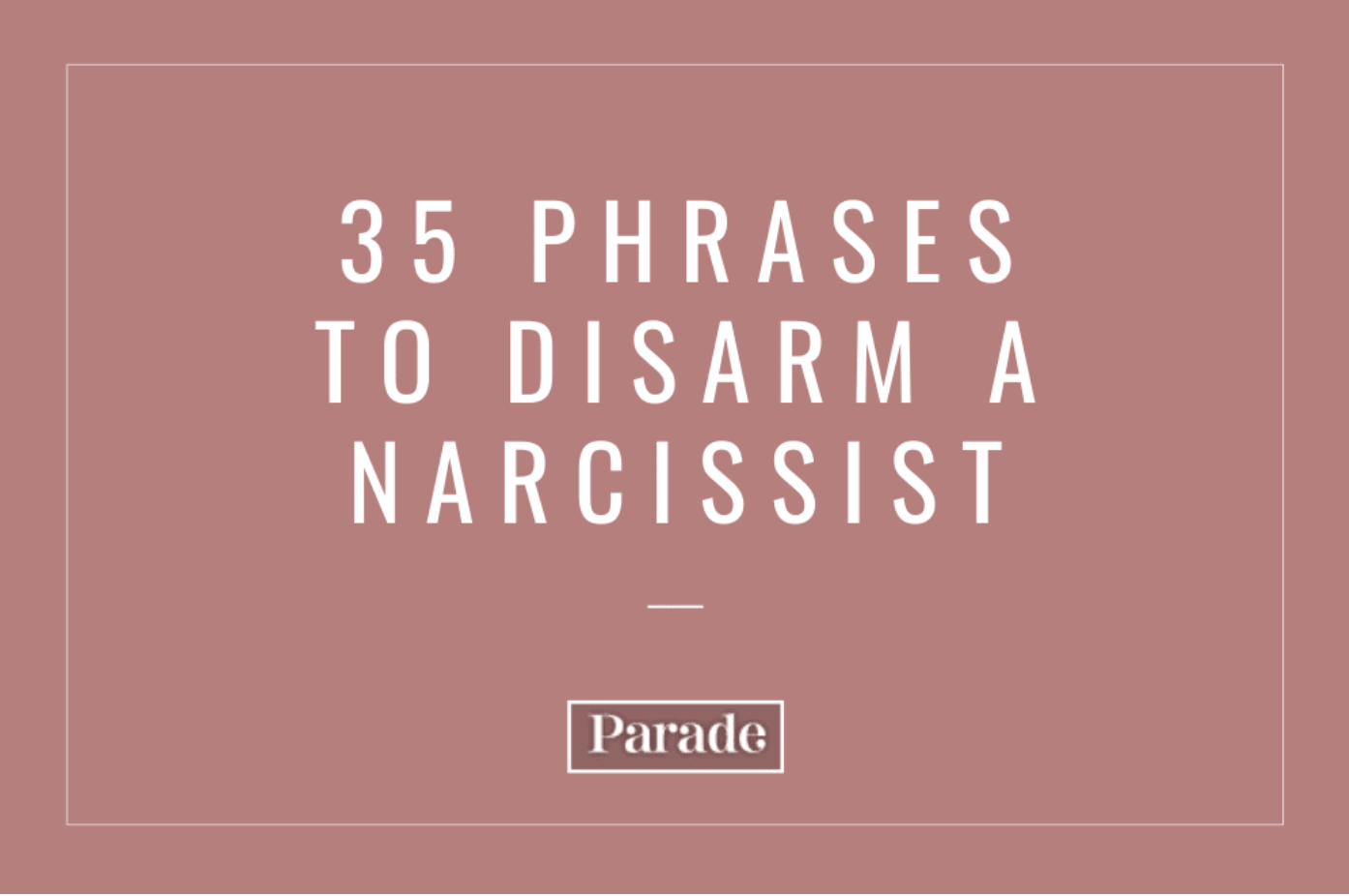Alena Scigliano | Source | Psychotherapist, Author, Media Consultant, Expert in Narcissistic Abuse at Al...

Alena Scigliano
Alena Scigliano, Founder and CEO of the group practice, Coastal Light Counseling & Psychotherapy, is a licensed psychotherapist, clinical expert in Narcissistic Abuse, and author of the book "Swimming with Sharks: Surviving Narcissist-Infested Waters", released under BookLogix, August 2023. Alena draws on her experience and expertise to increase public awareness of narcissistic abuse by leveraging the power of social media, training other mental health professionals, and engaging in speaking opportunities. She is also a leader in the business of counseling with expertise in the art of establishing & running a thriving group practice.
-
Coastal Light Counseling (https://www.CoastalLightCounseling.com)
Founder & CEO, Licensed Psychotherapist -
Alena Scigliano (http://www.alenascigliano.com)
Psychotherapist, Author, Media Consultant, Expert in Narcissistic Abuse
-
"Swimming with Sharks: Surviving Narcissist-Infested Waters" Media Kit
"Swimming with Sharks" Media Kit, including press release, selling sheet, author bio, & Q&A
Article -
Well+Good: This Manipulation Tactic Is a Sneaky Sign That Your Partner May Have Narcissistic Tendencies
If your partner often drags a third party into your conflicts for their benefit, they may be engaging in narcissistic triangulation.
Article -
Parade: "35 Phrases To Disarm a Narcissist and Why They Do the Trick, According to Therapists"
Here's exactly how to handle confrontations with a narcissist. By Shelby Deering, March 23, 2023
Article
-
Well+Good:
"In this way, the manipulative partner uses someone else to “do their bidding for them,” says psychotherapist and narcissistic abuse expert Alena Scigliano, LPC. “I see this happen a lot when people are separating,” she says. “The narcissistic partner will reach out to their partner's parents and downright lie about what's going on or exaggerate in order to try to get their in-laws on their side instead of on their partner's side.”
_______
But, Scigliano says people can display narcissistic traits without actually having the personality disorder. Those with narcissistic tendencies typically use various tactics to manipulate people around them, sometimes without even realizing it, Scigliano adds, and one of the most common is triangulation.
_______
“It’s partly human nature: We don’t want to feel like we’re the one who’s wrong,” says Scigliano. “But with narcissists [and those with narcissistic tendencies], they’re also not thinking about how their actions are impacting others.” Someone who's not a narcissist, by contrast, likely isn't using the third person so much as just trying to feel validated, she says.
_______
Triangulation is a type of narcissistic abuse, or ongoing psychological abuse, Scigliano says. “It’s pretty covert and difficult to pin down until it’s happened enough times and over a long enough period.” Below are four signs that your partner may be engaging in triangulation.
_______
Boundaries are your best tool for dealing with narcissists and those who display narcissistic traits, Scigliano says. “When it comes to triangulation, it could be saying, ‘You know what, this is between you and me. My mom does not need to be a part of this, or so-and-so does not need to be a part of this. You need to leave them out.’”You may need to set boundaries between you and your partner and you and whomever they’ve involved, Scigliano says."
____________________________________________
https://www.wellandgood.com/relationship-triangulation/ -
Well+Good:
"“A narcissist is someone who has a pathological level of narcissism,” says psychotherapist Alena Scigliano, LPC, founder of Coastal Light Counseling and Psychotherapy and author of Swimming with Sharks: Surviving Narcissistic-Infested Waters. However, notes Scigliano, narcissism is “inherently within all of us and it’s inherently healthy.” She points to the example of adolescents, who “need to have a healthy level of narcissism, so they can focus on themselves and become their own person separate from their parents.”
___________
Among the variations of narcissist types, Scigliano refrains from using the term “vulnerable narcissist.” “When a lot of people hear the word ‘vulnerable,’ they might think of vulnerable populations, or they think, ‘Oh, this is someone I need to take care of’—and that to me is where the risk is,” she says. Rather than think of pathological narcissists as vulnerable, she prefers to think of them as sharks. “We accept sharks as they are, we don’t expect them to change, and if there’s a shark in the water, we stay out of the water because they can be dangerous,” she says. “So, if we start thinking about narcissists that way, people will stop getting so hurt by narcissists because what perpetuates the cycle of narcissistic abuse is people hoping they’ll change.”
___________
According to Scigliano, both overt and covert narcissists have many traits in common, save for a few differences. Both are typically “antagonistic, argumentative, conflictual, contemptuous, and struggle to regulate their emotions,” she says. They can also be “entitled, egocentric, highly reactive, and manipulative, selfish, and, sometimes, tyrannical.”Also, she adds, they are empathy atypical, which means that they aren’t devoid of empathy but, rather, exhibit a different kind of empathy. “Let’s say their kid is getting picked on. It’ll seem like they have empathy for their kid because they can seem really upset,” she says. “But what I believe is that they see their child as an extension of them—as with their other family members—and what is really happening is that they’re empathizing with themselves.”
What an overt narcissist might have that covert types do not is charm, charisma, and an outgoing nature that is often exemplified by extroverts, says Scigliano. Interestingly enough, she adds that “overt or grandiose narcissists are typically extroverts that gain a lot of energy from being around other people.” Conversely, “the more covert narcissists are often more introverted.”
___________
Scigliano adds that with all the types of narcissists, the best way to cope with them is to first set strong boundaries—and stick with them. “This is the number one way to cope with having a narcissist in your life,” she says. She adds that if a conflict arises, she recommends sticking to the objective facts—“avoid sharing your emotions because they can use those against you.” Finally, she says to maintain a healthy level of wariness around the narcissist, but not to the point it can cause you undue stress.
___________
But experts point to several reasons for it. For one, people can be born with certain personalities that are predisposed to being less empathic and socially aware, according to Scigliano. This can often happen when a child is raised within a certain environment that engenders a focus on self.Commonly, a narcissistic person is often a product of a narcissistic parent. “If a child is raised by a narcissist, then they’re being repeatedly failed empathetically by their parent and hurt over and over and over,” she says. “That leads them to not be able to develop a healthy attachment to their parents but also a healthy sense of who they are—as result, they become really insecure and their sense of self is really fragile.” Scigliano uses the analogy of a glass orb to describe a narcissist’s sense of self. “Because it’s so fragile, they wrap it in bubblewrap over the years to try and protect it from being broken—and the bubblewrap is a combination of defense mechanisms and offense tactics,” she says."
____________________________
https://www.wellandgood.com/types-of-narcissists/ -
NEWSWEEK:
"According to Psychotherapist Alena Scigliano, narcissistic parents will try and control their children well beyond childhood."Just because a narcissist's child develops into an adult does not mean that the narcissist will start treating them any differently," she told Newsweek.
"Narcissists are very insecure people, and as a result they try to control everything and everyone around them, particularly those who are closest to them."
Scigliano said narcissistic parents don't view their children as individuals, and instead, see them as an extension of themselves. This leads to boundary stomping behavior, with more adult children than ever cutting ties with their parents.
"This loss of control triggers anxiety in the narcissist, they try to latch on even harder, thus perpetuating the cycle and essentially sabotaging the relationship they are trying so hard to hold onto," Scigliano said.
__________________https://www.newsweek.com/moms-excuse-returning-adult-daughters-packages-slammed-aita-1776481






